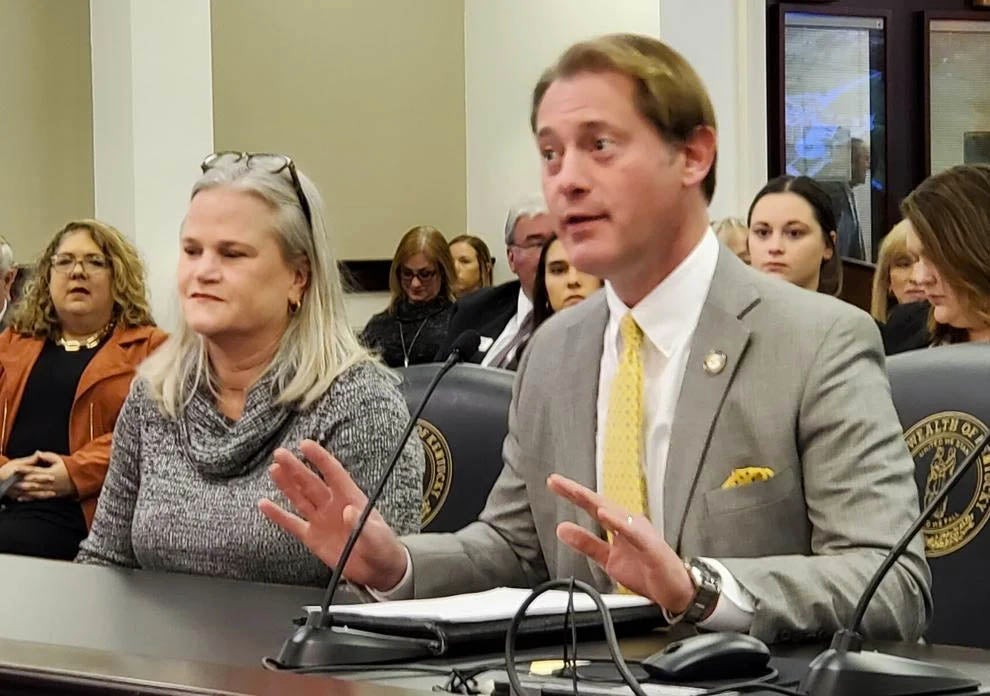‘Not screwing up is a huge win:’ Legislature addresses civics education, election changes
Published 1:56 pm Thursday, March 21, 2024

- Secretary of State Michael Adams continues to support early voting with more than 2 million Kentuckians expected to cast a ballot in November. (Kentucky Today/Tom Latek)
Several elections bills have progressed this session, while others have died quiet legislative deaths.
A bill that would remove student and employee IDs as acceptable voter proof of identification and another that would eliminate no-excuse early voting are “stuck,” said Secretary of State Michael Adams.
“That’s a win,” he said. “Just not screwing up is a huge win for us.”
House Bill 580: An elections omnibus
With a major presidential election on the horizon, Kentucky’s election officials are preparing for high turnout.
This session’s omnibus elections bill includes $13 million in new money for county clerks, who run elections on a local level, Adams said.
The increased pay is much needed, he said. As a teen poll worker, Adams said he made about $100 a day. In many counties, that amount hasn’t changed much in the past decades.
Over 10,000 volunteers are needed to run an election, but recent shortages have led to “excessive” poll closures, Adams said.
HB580 also changes how county clerks are reimbursed for elections.
Currently, clerks get a certain amount of money per precinct. However, Adams said that caused issues in 2022, when county clerks closed precincts at the last minute and still collected state reimbursements for those unused polling locations.
The elections omnibus would reimburse county clerks per voter instead of per precinct.
While the state can already commander buildings like schools and churches for Election Day voting, HB580 extends that power to early voting days.
Finally, the bill requires county clerks to turn over voting and polling plans 120 days before elections.
“We’ve had some games of chicken being played by some of the counties who will turn over their plan at the last minute,” Adams said. “And so that doesn’t give the State Board of Elections staff time to look at it. It doesn’t give me time and my staff time to look at it.”
While the bill includes various increases in payments, Adams said that nothing is certain until the budget actually appropriates the funds.
House Bill 535: Civics education
While he was grabbing coffee last week, Sen. Max Wise, R-Campbellsville, was asked to “keep Pelosi in line.”
Nancy Pelosi is a former speaker of the U.S. House of Representatives from California. Wise is a member of the Kentucky State Senate.
Secretary Adams said he gets letters, emails and social media tags from constituents asking about potholes and foreign policy. He deals with neither.
Kentuckians’ lack of civics understanding isn’t just anecdotal.
Recently, the Kentucky Civic Health Assessment found that barely half of Kentuckians could name the three branches of government, and more than a quarter could not name a single branch.
The assessment noted that even knowing the branches of government doesn’t mean one knows how they work or what they do.
About half of Kentuckians could name both Kentucky U.S. Senators and a local elected official.
To graduate, public school students must pass a 100-question civics test, using questions for the actual U.S. Citizenship and Immigration Services exam. They must get 60% right to pass.
This bill raises that threshold to 70%, but Adams called that “window dressing.”
“This test is absurdly easy and already 90% pass it,” he said. “So going from 60 to 70 doesn’t really make any difference.”
HB535 also gives local boards of education an alternative option—creating a half credit civics literacy course.
Curriculum would cover the role of various levels of government, state and federal constitutions, political parties, campaigns, elections, the three branches of government, domestic and foreign policy, civil rights, founding history and major government issues.
However, the original version of the bill fully replaced the 100-question civics test with this course, while the amended version allows boards to choose between the two.
Adams said he is “disappointed at the current state of the bill.” He said if given the option between going what they’ve always done or putting effort into creating a new civics course, he doubts many will opt for the latter.
“I would rather that they take this bill, rework it to what it had been before the committee sub or just scrap it and come back next year,” Adams said. “But I’m afraid that if they pass it in its current form, all that we’ll get out of it is legislators can say, ‘Oh yeah, we fixed civics,’ and then they never touch it again.”
Rep. James Tipton, R-Taylorsville, said that the amended version was the result of a compromise in the House. Some members were concerned about adding in new graduation requirements.
The Kentucky Department of Education would gather data on the percentage of students who pass the civics exam on the first try, as well as the average number of times it takes students to pass, if the bill passes. Tipton said that this data could help them potentially bolster this bill in future sessions.
It’s not just about knowing facts or increasing voter turnout; it’s about creating an informed electorate that can hold their government accountable, Adams said.
Rep. Robert Duvall, R-Bowling Green, agreed. Both mentioned the soft skills that civics education can cultivate.
“Through learning about citizens rights and responsibilities, they will be better prepared to serve as leaders in their community,” he said. “Civically-literate individuals can make informed decisions when voting, plus they can engage in constructive dialogue with others who hold different opinions.”





